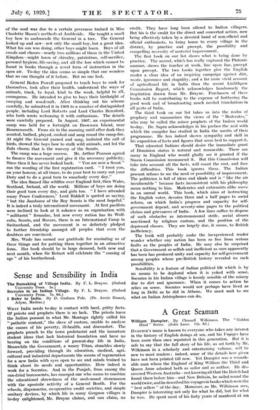Sense and Sensibility in India
The Remaking of Village India. By F. L. Brayne. (Oxford University Press. 5s.) Socrates in an Indian Village. By F. L. Brayne. (Oxford University Press. 7s. lid.)
WHAT India needs to-day is contact with hard, gritty facts. Of priests and prophets there is no lack. The priests leave the Indian peasant in what Mr. Montagu rightly called his "pathetic content," the slave of custom, unable to analyse the causes of his poverty, ill-health, and discomfort. The prophets preach to the town proletariat and the immature student ideas that lack historical foundation and have no bearing on the conditions of present-day life in India. Meanwhile the Government, a weary Titan, stumbles slowly forward, providing through its education, medical, agri- cultural and industrial departments the means of regeneration for a new India with eyes open to see and minds trained to think about its needs and opportunities. Here indeed is work for a Socrates. And in the Punjab, from among the sun-dried bureaucrats, has emerged one who seems to combine the educational shrewdness of the snub-nosed stonemason with the apostolic activity of a General Booth. For the schools, dispensaries, co-operative credit societies, and simple sanitary devices, by which life in many Gurgion villages is to-day enlightened, Mr. Brayne claims, and can claim, no credit. They have long been offered to Indian villagers. But his is the credit for the direct and concerted action, now being effectively taken by a devoted band of non-official and official enthusiasts, to bring home to every village in the district, by practice and precept, the possibility and compelling necessity of material improvement.
The first book on -our list shows what is being done by practice. The second, which has really captured the Platonic manner, shows the teacher at work, line upon line, precept upon precept. The two books together give the English reader a clear idea of an inspiring campaign against dirt, waste, ignorance and stupidity, and a far more vivid account of agricultural life in India than the recent Linlithgow Commission Report, which acknowledges handsomely the inspiration drawn from Mr. Brayne. Purchasers of these books will be contributing to the expense of furthering the good work and of broadcasting much needed translations in all parts of India.
The third book on our list takes us into the realm of prophecy and summarizes the views of the "Moderates," who may be called the minor prophets of the Indian world to-day. Dr. Sapru acknowledges in his preface the zeal with which the compiler has studied in India the merits of their programme. He has indeed shown sympathy and skill in his exposition of facts and figures that seem best to support it That educated Indians should desire the immediate grant of Dominion status is natural and reasonable. There are many in England who would gladly see it granted if the Simon Commission recommend it. But this Commission will take into account all the facts, will count the cost, and face the difficulties. This book ignores them. The Indian peasant refuses to see the need or possibility of improvement. The politician is full of ideas and ideals and is "like the air invulnerable" because facts inconsistent with his philosophy mean nothing to him. Moderates and extremists alike move in an unreal world. This book, which aims at instructing the English voter, devotes three and a half pages to social reform, on which India's progress and capacity for self- government depend, and seventy-nine pages to the political claims and grievances of India. A few lines suffice to dispose of such obstacles as intercommunal strife, social abuses sanctioned by religious custom, and the position of the depressed classes. They are largely due, it seems, to British inefficiency.
The book will probably make the inexperienced reader wonder whether any nation has been so free from serious faults as the peoples of India. He may also be surprised that a Government so selfish and inefficient as ours apparently has been has produced unity and capacity for self-government among peoples whose pre-British history revealed no such possibilities.
Sensibility is a feature of Indian political life which is by no means to be deplored when it is yoked with sense. Socrates in his Indian village is keenly sensible of the misery due to dirt and ignorance. When it comes to action he relies on sense. Socrates would not perhaps have lived as long in Delhi as he did in Athens. We must wait to see what an Indian Aristophanes can do.










































 Previous page
Previous page